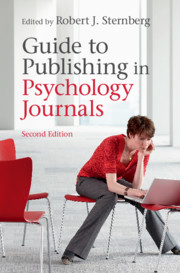Book contents
- Guide to Publishing in Psychology Journals
- Guide to Publishing in Psychology Journals
- Copyright page
- Contents
- Contributors
- Preface
- Part I Kinds of Articles
- Part II Parts of Articles
- Part III The Journal Submission and Resubmission Process
- Part IV Systemic Issues
- Chapter 19 Transparent Science
- Chapter 20 Open Access
- Chapter 21 Ethical Considerations in Submitting Articles
- Part V Conclusion
- Index
- References
Chapter 19 - Transparent Science
A More Credible, Reproducible, and Publishable Way to Do Science
from Part IV - Systemic Issues
Published online by Cambridge University Press: 19 November 2018
- Guide to Publishing in Psychology Journals
- Guide to Publishing in Psychology Journals
- Copyright page
- Contents
- Contributors
- Preface
- Part I Kinds of Articles
- Part II Parts of Articles
- Part III The Journal Submission and Resubmission Process
- Part IV Systemic Issues
- Chapter 19 Transparent Science
- Chapter 20 Open Access
- Chapter 21 Ethical Considerations in Submitting Articles
- Part V Conclusion
- Index
- References
Information
- Type
- Chapter
- Information
- Guide to Publishing in Psychology Journals , pp. 219 - 237Publisher: Cambridge University PressPrint publication year: 2018
References
Accessibility standard: Unknown
Why this information is here
This section outlines the accessibility features of this content - including support for screen readers, full keyboard navigation and high-contrast display options. This may not be relevant for you.Accessibility Information
- 2
- Cited by
